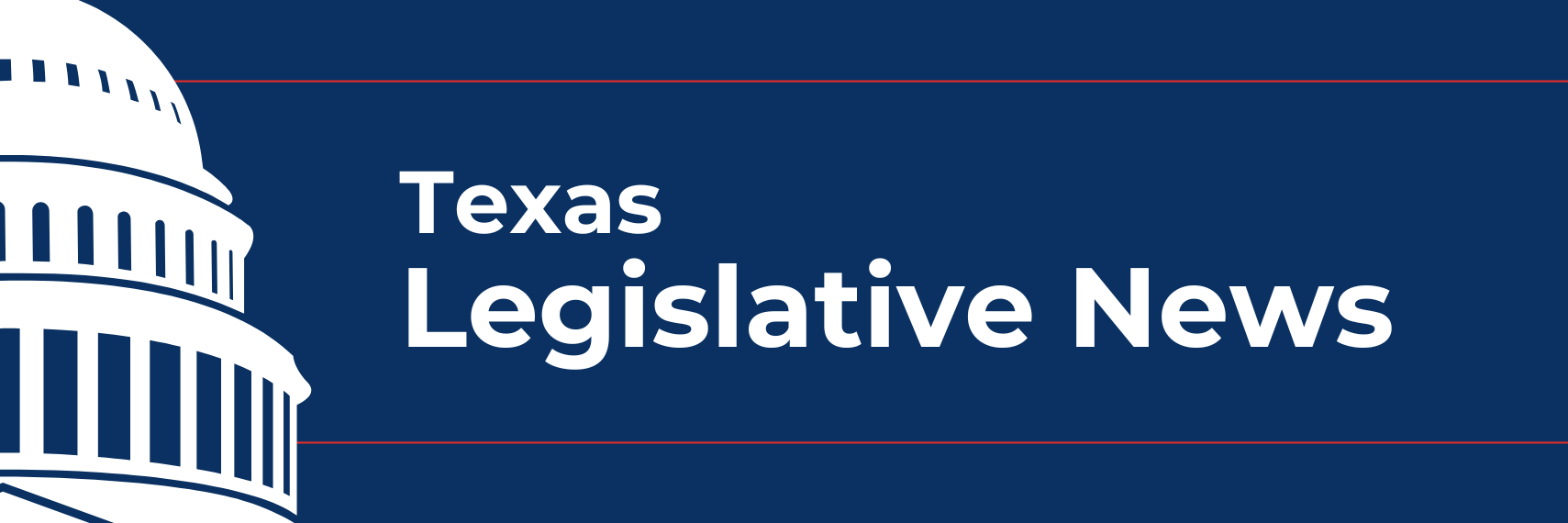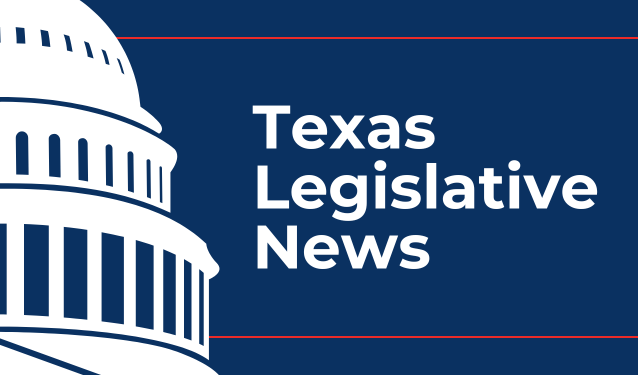

Table of Contents
Welcome to the latest edition of Texas Legislative News for the 89th Texas Legislature. In this regular feature, we provide information on disability-related issues and bills under consideration at the State Capitol. We also explain how lawmakers conduct business, and we share details on upcoming TCDD events.
With the legislative session now over, we’re taking stock of what happened in the session’s final days and sharing outcomes that might impact people with developmental disabilities (DD). This week, we focus on health and safety.
What Did Lawmakers Do About Health and Safety?
TCDD adopted the following public policy priority on health and safety for the legislative session: Ensure Texans with disabilities have equal access to and are proactively included in using all community resources designed to maintain and improve individual and public health and safety, including during public health emergencies. Texans with disabilities deserve health care that is available, accessible, and affordable, as well as emergency planning that is responsive to their needs.
Here are some of the proposed measures we tracked during the session that related to this topic.
Attendant Rates
In recent sessions, increasing base pay rates for community attendants has been a top priority for disability organizations. TCDD’s own public policy priority on the matter calls to “raise the minimum requirement for rates and wages of community attendants in Texas who work with people with disabilities, and provide training to better prepare them to meet the needs of those they assist.”
This session, Senate Bill (SB) 1, the general appropriations bill, raised the pay rate for community attendants to $13 per hour.
Back in 2023, lawmakers increased the rate from $8.11 to $10.60 per hour. At the time, disability advocates said the increase wouldn’t be enough to address hiring and retention issues in the field, particularly as entry-level positions at fast food restaurants and gas stations pay more.
This year, legislation was filed to raise the pay rate to $15 per hour, and some organizations were calling for a base wage of $20. Now that lawmakers have approved an amount well below those goals, we expect advocates will continue raising this issue at the Capitol leading into the next session in 2027.
Compassionate-Use Program
Lawmakers enacted the Texas Compassionate-Use Program in 2015. The program provides for the use of low-THC cannabis as treatment for a limited set of medical conditions. Initially approved for people with intractable epilepsy, lawmakers have since expanded the program’s eligibility to include people with seizure disorder, multiple sclerosis, autism, cancer, post-traumatic stress disorder, and other conditions.
This session, lawmakers passed House Bill (HB) 46, by Rep. Ken King, which further expanded the program’s eligible conditions to include chronic pain, traumatic brain injury, Crohn’s disease or other inflammatory bowel diseases, and a terminal illness or a condition for which a patient receives hospice or palliative care.
Additionally, HB 46 modified allowable distribution processes for low-THC cannabis as medication. Some of the changes include allowing authorized dispensing organizations to open satellite locations in addition to their primary locations. Doctors are now also allowed to prescribe low-THC cannabis as an aerosol or vapor that patients can inhale. Gov. Greg Abbott signed HB 46, and the new law takes effect on Sept. 1, 2025.
Dementia Prevention and Research
An estimated 6.9 million Americans age 65 and older live with Alzheimer’s disease, and that number expected to double by 2060, according to a report from the Alzheimer’s Association. The cost of caring for those individuals in 2024 was projected at $360 billion, which marked a $15 billion increase from the previous year. These statistics highlight the growing urgency to invest in research, prevention, and treatment strategies for Alzheimer’s and similar conditions.
This session, the Legislature approved SB 5, by Sen. Joan Huffman, to establish the Dementia Prevention and Research Institute of Texas. The institute would conduct research on dementia, Alzheimer’s disease, Parkinson’s disease, and other related conditions to improve the health of Texans and enhance the potential for medical or scientific breakthroughs.
The creation of the institute, as well as an associated Dementia Prevention and Research Fund, will require voter approval of Senate Joint Resolution 3. The resolution will be included as a state constitutional amendment on the Nov. 4 ballot. If approved by voters, the amendment will direct the state comptroller to transfer $3 billion from the state’s general revenue into the new fund.
Emergency Preparedness
Natural disasters such as Winter Storm Uri in 2021 have shown the need for more planning to address the emergency needs of people with disabilities across the state. According to a TCDD position statement: “People with DD deserve respectful, prompt, and efficient assistance during ‘shelter in place,’ evacuation, and relocation resulting from a natural disaster or emergency event. Individuals must have access to appropriate and accessible transportation, shelter, medical and mental health care, and information on temporary support services.”
The following notable bills related to emergency preparedness were filed this session but did not pass:
- HB 1199, by Rep. Christian Manuel, relating to emergency generators or other power sources for nursing facilities and assisted-living facilities.
- HB 5239, by Rep. Penny Morales Shaw, relating to requiring certain governmental entities to allow public comment on proposed adoptions or revisions of certain emergency management plans.
- SB 272, by Sen. Molly Cook, relating to electric utility planning and cost recovery to enhance service reliability for vulnerable customers.
- SB 481, by Sen. Carol Alvarado, relating to emergency preparedness and response plans for the continued care and safety of residents in nursing facilities and assisted-living facilities.
Peer Support
Peer-support services include programs where people develop knowledge and experience as well as emotional, social, and practical help with support from people with similar backgrounds.
In 2017, Texas began to allow Medicaid funding to pay for peer-support services involving mental health and substance use. Disability advocates have said Medicaid funding should also be extended to peer-support services for people with DD. A number of TCDD-funded projects have demonstrated the success of peer-support services in helping people with DD with relationships, health care needs, and employment.
This session, the following bill related to peer support was filed but failed to pass:
- HB 1941, by Rep. Liz Campos, which would have allowed Medicaid reimbursements for peer-support services for people with DD. The bill was featured as a TCDD Bill of the Week.
Strategic Planning
Lawmakers filed a variety of bills this session to study, recommend, and implement new strategies to deliver services to Texans with DD. These efforts were generally unsuccessful. Here are some notable bills that failed to pass:
- HB 1541, by Rep. Suleman Lalani, relating to the establishment of an advisory committee to study and make recommendations on services provided to people with DD.
- HB 2542, by Rep. Stan Kitzman, relating to the establishment of a work group to study and make recommendations on certain services needed by people with DD.
- HB 2807, by Rep. Toni Rose, relating to a statewide intellectual and developmental disability coordinating council. This bill was featured as a TCDD Bill of the Week.
- SB 2397, by Sen. Charles Perry, relating to the establishment of the task force on disability policy.
Governor Issues Vetoes, Announces Special Session
Sunday, June 22, was the deadline for the governor to take action on bills passed during the legislative session. On the day of the deadline, the governor announced vetoes for a variety of bills, bringing the final total of governor vetoes from the session to 26. The list does not appear to include any bills primarily related to disability issues.
The following day, the governor announced he would call lawmakers back for a special session beginning on July 21. During the special session, lawmakers will consider topics that include hemp regulation, water projects, trafficking, and judicial operations. While these topics don’t appear to focus on disability issues, the governor can place additional topics on the special session agenda.
Once the special session convenes, the Legislature will have 30 days to complete its business. Afterward, the governor can decide whether to call lawmakers back for another special session. We’ll watch the developments and share any relevant updates.
Tomorrow: A Capitol Recap on Disability Policy
On Wednesday, June 25, TCDD will host a Disability Policy Academy titled “A Capitol Recap: Disability Policy in the 89th Legislature.” The free event is open to the public and will feature:
- an overview of new disability-related laws;
- a summary of disability issues that remain unaddressed;
- a discussion on topics lawmakers may cover in the legislative interim; and
- a Q&A session with TCDD’s public policy analysts and other disability advocates.
Participating organizations include the Autism Society of Texas, the Coalition of Texans with Disabilities, Texas Advocates, and Texas Parent to Parent.
The event will be held via Zoom. Participants must register ahead of time to attend. TCDD will provide Communication Access Real-time Translation (CART) service. If you need other accommodations to participate, please indicate that when registering and email Koren Vogel or call her at 512-948-2035.
Date: Wednesday, June 25
Time: 1-2:30 p.m. Central Time
